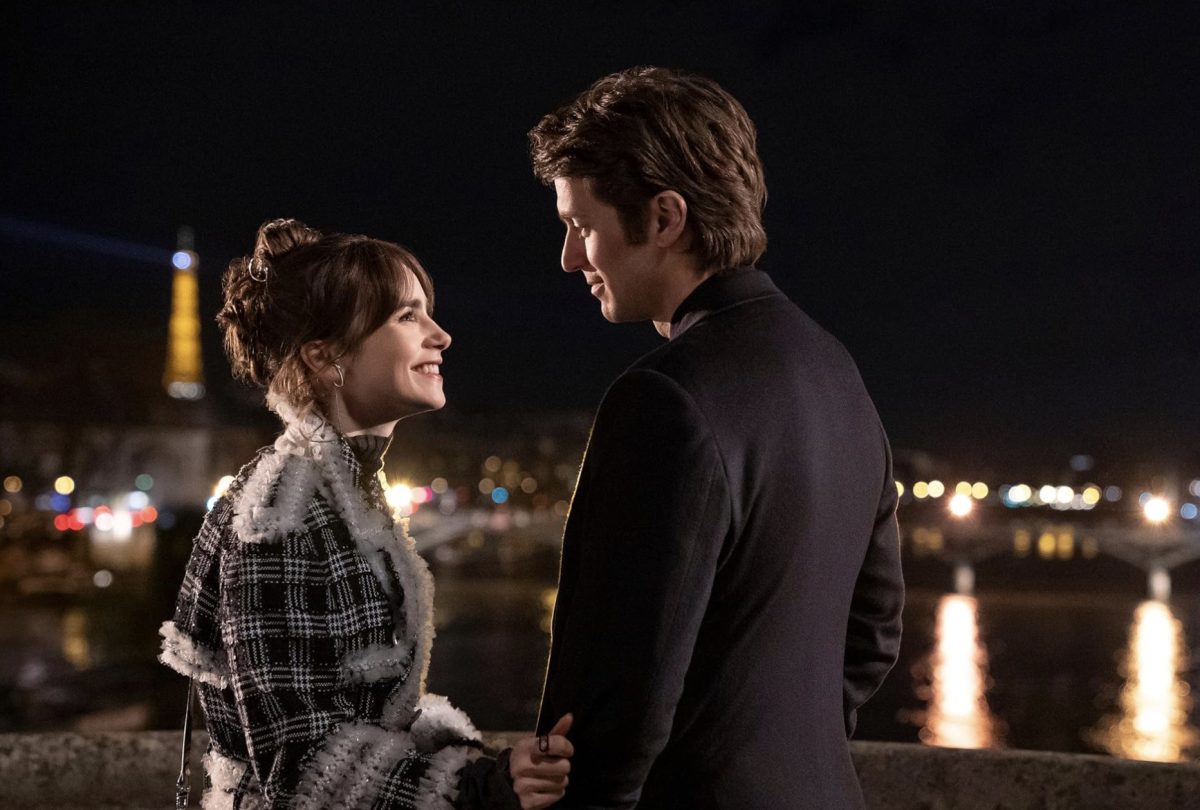Warning: This review contains spoilers for “Emily in Paris.”
“Emily in Paris” isn’t the type of show you watch for complex writing, high-stakes plotlines or even well-developed characters. From the get-go, the show has acted as a sort of baby-sensory sitcom for people who love flashy marketing, flashier fashion and love affairs that can’t seem to be resolved. The fourth installation of the series is no different, but the two-part season finale offers some shifts in the story, even if it takes ten episodes to get there.
The previous season ends with Camille (Camille Razat) breaking off her engagement with the main love interest of the show, chef Gabriel (Lucas Bravo), claiming that he had been in love with Emily (Lily Collins) since he met her and that their marriage would never work. To make matters worse, it was revealed that Camille was having an affair with another woman, Sofia (Melia Kreiling), while pregnant with Gabriel’s child. During this nightmare of events, Emily was dating British banker Alfie (Lucien Laviscount), yet another victim of Emily and Gabriel’s recurring romance.
The first part of season four includes five episodes, jam-packed with plotlines, most of which are completely unnecessary. Alfie breaks up with Emily, noticing the evident tension between her and Gabriel, Camille continues to go out with Sofia, and Emily and Gabriel finally get together after four seasons, but the result is lackluster. After all the drama they’ve been involved in, Emily and Gabriel don’t quite fit into the normal-couple narrative, especially with Camille’s baby on the way. The first part of the season ends with the most exhausting update to the Camille-Gabriel-Emily love triangle: Camille actually had a false positive pregnancy test, but didn’t tell anyone.
A month later, the second part of the season was released, providing a more exciting ending to the tiring first half. As soon as Emily and Gabriel get together, they have a dull breakup after a few disputes about Camille’s involvement in his life, and Marcello (Eugenio Franceschini), Emily’s new Italian love interest, quickly enters the picture. Camille eventually confesses to her faux-baby and disappears for most of the season. Emily’s boss, Sylvie (Philippine Leroy-Beaulieu), hires Genevieve (Thalia Besson), a former NYU student and the illegitimate daughter of one of her many love affairs, to work at the main marketing agency. The season ends with Marcello encouraging Emily to open a branch of Agence Grateau in Rome after hearing about his family’s luxury cashmere business. Therefore, “Emily in Paris” is technically now Emily in Rome.
If you aren’t already tired of digesting the plotlines, know there was an exhausting effort this season to create stories for every character, major and minor. Most of these stories felt forced and unnatural, resulting in half-baked character development across the board. After Gabriel spends multiple episodes airing out grievances as to why he and Emily wouldn’t work as a couple, his sudden renewed interest in the relationship at the end of the season felt more like a ploy to keep viewers interested, than a believable narrative between the two characters.
Splitting the season into two parts was utterly unnecessary, and Netflix’s decision to use this format for their major shows is getting old. It showcased a lack of confidence from the creators to craft a cohesive, thought-out story without separating it with a useless time-jump. Random tensions come out of nowhere to advance plot points well past their prime. This is especially evident with the on-again-off-again nature of Emily and Gabriel’s relationship and Camille’s serial lying, which comes off as forced rather than intriguing and necessary.
However, it’s easy to give this show a lot of slack. After all, I’m still here after four seasons. “Emily in Paris” is highly addictive, providing the quintessential show for anyone looking for something light and upbeat. I can appreciate the fact that the show never takes itself too seriously. It’s bright and entertaining, and you can’t help but love the leading ensemble, despite their questionable judgment.
There even was an effort to make the show more cinematically interesting this season, with more emphasis on various shot angles and lenses being utilized, especially during the season’s vivid opening episode at the French Open. The inclusion of new characters and locations provided a refreshing touch to the show, diverging from the same frivolous melodramas of Paris from past seasons.
Emily’s decision to move to Rome and live with Marcello by the end of the season provides a hopeful new future for the show, although it’s clear that Gabriel hasn’t given up on Emily yet. “Emily in Paris” doesn’t exactly wow viewers with exceptional content, but it never has. The fourth season provides a predictable, yet compelling update to one of Netflix’s most unserious shows, ending with a pleasing shift as we finally see Emily say au revoir to the City of Love.
Contact Amelia Knust at [email protected].
























































































































































